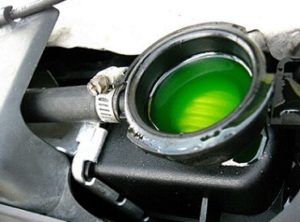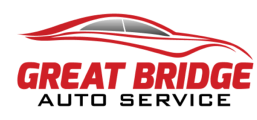Coolant, otherwise known as antifreeze, helps protect your engine’s vulnerable aluminum parts, mainly the radiator and heater core that are found in the cooling system. It removes rust and scale build-up and lubricates the water pump. It also provides the crucial barrier that keeps your engine from freezing or overheating. That’s a lot of responsibility placed on a single fluid.
Being sure that your antifreeze is in good condition is important. Your owner’s manual can show you where the coolant reservoir is located so you can keep tabs on your antifreeze’s health. Of course, we at Great Bridge Auto Service will gladly check yours and include a courtesy “capping off ” of all fluids at every oil change.
General Coolant Questions
What color is antifreeze?

Knowing the color of fluids is important because you ALWAYS want to locate and replace fluids in the correct reservoirs. Mixing them up can create critical engine problems.
- green
- yellow
- blue
- red
- orange
How often should antifreeze be checked?
Honestly, at every oil change. When you bring your vehicle to us, we always inspect and “cap off” all fluids as a courtesy.
How do I know if my antifreeze needs changing?
- If the coolant appears rusty or particles are seen floating in it.
- Your coolant reservoir is low.
- Your vehicle overheats easily.
- If you have frequently added plain water, the 50/50 ratio of antifreeze/water has probably been compromised.
How often should you have a coolant flush?
Generally, about every 40,000 – 60,000 miles, but refer to your owner’s manual for specifics.
Why you need to be careful when adding antifreeze?
- Adding it to the wrong reservoir can cause engine damage.
- Putting in coolant so that the ratio is higher than a 70/30 antifreeze to water ratio actually increases the boiling point and freezing point. This means your engine could overheat or freeze more easily.
- If your engine is made with aluminum, be sure that the antifreeze you’re using is designed for aluminum engines.
- Always refer to your owner’s manual for the correct coolant type.
